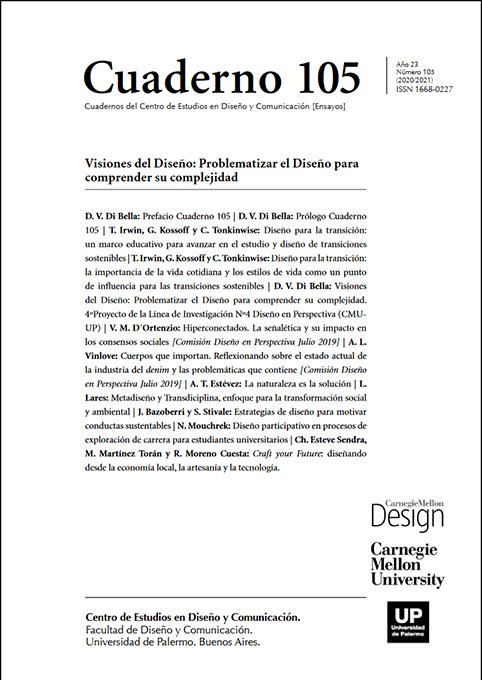Transition Design: The Importance of Everyday Life and Lifestyles as a Leverage Point for Sustainability Transitions
Resumo
O desafio central da era atual é a transição para a sustentabilidade. Essa transição deve ser definida nos termos mais amplos possíveis. É um projeto político, social, econômico, cultural, científico e tecnológico: todas as dimensões dos assuntos humanos são desafiadas pela necessidade de transição e, como várias questões atingem pontos críticos (mudança climática, desigualdade, esgotamento de recursos, perda de biodiversidade, etc.) aumenta a urgência com que isso deve acontecer. A Escola de Design da Universidade Carnegie Mellon respondeu a esse desafio introduzindo o que chamou de “Design para Transição” nos currículos dos níveis de graduação, pós-graduação e doutorado (Irwin 2015) e que “leva como premissa central a necessidade de transições sociais em direção a futuros mais sustentáveis e argumenta que o design tem um papel fundamental a desempenhar nessas transições ”(Irwin et al. 2015b: 1).
Referências
Bourdieu, P. (1997). Outline of a Theory of Practice. Cambridge: Cambridge University Press.
Buber, M. (1996). Paths in Utopia. New York (NY): First Syracuse University Press.
Capra, F. & Luisi, P. (2014). The Systems View of Life: A Unifying Vision. Padstow (UK): Cambridge University Press.
Cohen, N. & Ilieva, R. T. (2015). Transitioning the Food System: A strategic practice management approach for cities. Environmental Innovations and Societal Transitions. Available online [accessed 8.4.15] http://www.sciencedirect.com/science/article/pii/S2210422415000052
Debord, G. (2002). Perspectives for Conscious Alteration in Everyday Life. In: Highmore, Ben. The Everyday Life Reader. London (UK): Routledge.
Gardiner, M. E. (2000). Critiques of Everyday Life. London (UK): Routledge.
Geels and Schot. (2010). The Dynamics of Transitions: A Socio-Technical Perspective. In: Grin, John, Rotmans, Jan and Schot, Johan. Transitions to Sustainable Development. London (UK): Routledge.
Giddens, A. (1984). The Constitution of Society. Cambridge: Polity Press
Grin, J. (2010). Understanding Transitions from a Governance Perspective. In: Grin, John, Rotmans, Jan and Schot, Johan. Transitions to Sustainable Development. London (UK): Routledge.
Grin, J.; Rotmans, J. and Schot, J. (2010). Conclusion: How to Understand Transitions? How to Influence Them? Synthesis and Lessons for Further Research. In: Grin, John, Rotmans, Jan and Schot, Johan. Transitions to Sustainable Development. London (UK): Routledge.
Hargreaves, T.; Longhurst, N. and Seyfang, G. (2012). Understanding Sustainability Innovations: Points of Intersection Between the Multi-Level and Social Theory. UEA Norwich, Science, Society and Sustainability (3S) Research Group
Irwin, T.; Tonkinwise,C. and Kossoff, G. (2015a), Transition Design: an educational framework for advancing the study and design of Sustainable Transitions, 6th IST Conference, University of Sussex, Brighton.
Irwin, T. (2015). Redesigning a Design Program: How Carnegie Mellon University is Developing a Design Curricula for the 21st Century, Solutions Journal. Available online [accessed 07.01.15] http://www.thesolutionsjournal.com/node/2372962015
Irwin, T.; Kossoff, G.; Tonkinwise, C. and Scuppelli, P. (2015b). Transition Design Overview. Carnegie Mellon School of Design, Pittsburgh. Available online [accessed 07.01.15] https://www.academia.edu/13122242/Transition_Design_Overview
Kuijer, L.; De Jong, A. and Van Eijk, D. (2013). ACM Transactions on Computer-Human Interaction, 20: 4. New York: ACM Inc.
Koestler, A. (1975). The Ghost in the Machine. London (UK): Pan Books.
Kossoff, G. (2011a). Holism and the Reconstitution of Everyday Life: A Framework for Transition to a Sustainable Society. Ph.D. diss., University of Dundee, Scotland.
Kossoff, G. (2011b). Holism and the Reconstitution of Everyday Life: A Framework for Transition to a Sustainable Society. In: Harding, Stephan, ed. Grow Small, Think Beautiful. Edinburgh (UK): Floris Books.
Lefebvre, H. (2008). Critique of Everyday Life, vol. 1. London (UK): Verso.
Marshall, P. (2010). Demanding the Impossible: A History of Anarchism. Oakland (CA): PM Press.
Strengers, Y. and Maller, C. (2011). Integrating Health, Housing and Energy Policies: Social Practices of Cooling. In: Building Research and Information 39 (2)154-168. London (UK): Routledge.
Max-Neef, M. A. et al. (1992). Human Scale Development: Conception, Application and Further Reflections. New York (NY): Apex. Available online [accessed 8.1.15] http://www.area-net.org/fileadmin/user_upload/papers/Max-neef_Human_Scale_development.pdf
Mumford, L. (1961). The City in History: Its Origins, Its Transformations and its Prospects. London: Secker and Warburg.
Robertson, B. J. (2015). Holocracy: The New Management Systems for a Rapidly Changing World. New York (NY): Henry Holt and Company, LLC.
Rotmans, J. and Loorbach, D. (2010). Toward a Better Understanding of Transitions and Their Governance: A Systemic and Reflexive Approach. In: Grin, John, Rotmans, Jan and Schot, Johan. Transitions to Sustainable Development. London (UK): Routledge.
Sahakian, M. and Wilhite, H. (2014). Making Practice Theory Practicable: Towards More Sustainable Forms of Consumption. In: Journal of Consumer Culture 14: 25. Thousand Oaks (CA): Sage.
Scott, J. C. (1999). Seeing Like a State: How Certain Schemes to Improve the Human Condition Have Failed. New Haven (CT): Yale University Press.
Seyfang, G. (2010). Community Action for Sustainable Housing: Building a low-carbon future. Energy Policy. 38: 7624-7633.
Schatzki, T. (2010). Timespace and Human Activity: On Performance, Society, and History as Indeterminate Teleological Events. Latham, MD: Lexington Books.
Sheringham, M. (2009). Everyday Life: Theories and Practices from Surrealism to the Present. Oxford (UK): Oxford University Press.
Shove, E.; Pantzar, M. & Watson, M. (2012). The Dynamics of Social Practice: Everyday LIfe and How it Changes. London (UK): Sage Publications.
Shove, E. & Walker, G. (2010). Governing Transitions in the Sustainability of Everyday Life. Research Policy. 39: 471-476.
Smith, D. (1987). The Everyday World as Problematic: A Feminist Sociology. Boston: Northeastern University Press.
Strengers, Y. (2010). Conceptualising Everyday Practices: Composition, Reproduction and Change. Centre for Design, Melbourne, RMIT University and University of South Australia.
White, D. & Kossoff, G. (2007). Anarchism, Libertarianism and Environmentalism: AntiAuthoritarian Thought and the Search for Self-Organizing Societies.The SAGE Handbook of Environment and Society. London (UK): Sage Publications. pp. 50-64.
Wilber, K. (2011). A Theory of Everything: An Integral Vision for Business, Politics, Science, and Spirituality. Boston (MA): Shambhala Publications Inc.
Los autores/as que publiquen en esta revista ceden los derechos de autor y de publicación a "Cuadernos del Centro de Estudios de Diseño y Comunicación", Aceptando el registro de su trabajo bajo una licencia de atribución de Creative Commons, que permite a terceros utilizar lo publicado siempre que de el crédito pertinente a los autores y a esta revista.


